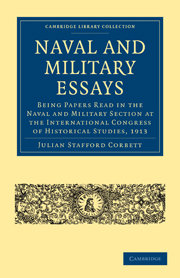 Naval and Military Essays
Naval and Military Essays Published online by Cambridge University Press: 07 September 2010
The naval officer lives close to the elemental things of life. His ambition is to make history, not to study it. He is a profound believer in the practical, and unless history can be translated into terms of his favourite cult he will continue to regard it with indifference and suspicion. And yet, our Navy, sovereign mistress of the avenues of revictualment and reinforcement, inherits a greater history than any other nation's, and the marrow of a true doctrine lies hidden in the despatches of our great admirals; but it lies for the most part ensepulchred on dusty shelves, and the naval officer confines himself to the occasional and wholly uncritical perusal of some small text-book. From 1860 to 1900, the key-note of higher education in the Navy was a child-like faith in mathematics, with the result that, up to a few years ago, history remained the Cinderella of naval sciences. This neglect has had certain inevitable results. While unexampled attention has been given to things material and mechanical, the study of the wider aspects of strategy has been left to itself.
Great issues, mirrored in the past, rush down upon us, and their attendant problems remain unsolved because we nurse the idea that the study of our earlier struggles is useless, unproductive and out of date. History is regarded by the naval officer as a dead science. Trained in mathematics, a science which deals with quantity and ignores qualitative differences, he rarely looks beyond the horizon of technical study, and like John Roskruge, is of opinion that a sailor's ideas should go no further than the jib-boom end.
To save this book to your Kindle, first ensure [email protected] is added to your Approved Personal Document E-mail List under your Personal Document Settings on the Manage Your Content and Devices page of your Amazon account. Then enter the ‘name’ part of your Kindle email address below. Find out more about saving to your Kindle.
Note you can select to save to either the @free.kindle.com or @kindle.com variations. ‘@free.kindle.com’ emails are free but can only be saved to your device when it is connected to wi-fi. ‘@kindle.com’ emails can be delivered even when you are not connected to wi-fi, but note that service fees apply.
Find out more about the Kindle Personal Document Service.
To save content items to your account, please confirm that you agree to abide by our usage policies. If this is the first time you use this feature, you will be asked to authorise Cambridge Core to connect with your account. Find out more about saving content to Dropbox.
To save content items to your account, please confirm that you agree to abide by our usage policies. If this is the first time you use this feature, you will be asked to authorise Cambridge Core to connect with your account. Find out more about saving content to Google Drive.